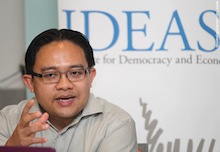The real state of national unity

There is no logic behind the call for more government intervention. The Government has been intervening since the 1970s and the outcome is what we have today. How is more of the same going to help?
Wan Saiful Wan Jan, The Star
On the ground, people are actually quite happy living side by side, befriending each other.
I WAS giving a keynote speech at a conference in Bologna, Italy, on Sept 16.
I missed IDEAS’ national conference on unity that was held on that day.
The conference marked the culmination of almost eight months of hard work by the group of 21 Ideas National Unity Youth Fellows.
We announced their appointment in February this year.
We then took them to almost every state in the country to meet with community leaders on the ground.
My team and I travelled with them from Perlis to Johor to Sabah and Sarawak, observing directly how things are at the grassroots level.
Our aim was to help them discover the real state of national unity at the level of the common men and women, free from the noises that usually cloud social media and the Kuala Lumpur bubble.
I must admit that I myself learnt a lot from the journey.
It may have cost us almost RM400,000 to run this whole project from start to finish, but it was worth every sen.
It was quite an experience to be able to talk to the uncles and aunties, to understand their concerns.
My main take from the project is that I should never trust any politician from an ethnic-based party when they claim to be working for national unity.
On the ground, people are actually quite happy living side by side, befriending each other.
But every time politicians with an ethnic agenda come into the picture, we are immediately divided.
I also observed how it is actually in the interest of politicians from ethnic and religion-based political parties to keep us divided along ethnic and religious lines.
For if we are united and if we do not care anymore about ethno-religious division, all the ethnic-based political parties will become irrelevant.
While the pakcik and makcik whom I met during the eight months were mainly concerned about cost of living and their daily meals, politicians from ethnic-based political parties want them to continue thinking about the “fate” of their respective ethnic groups.
If the Malays, Chinese, Indians, Ibans, Kadazans, Melanaus and everybody else were to behave and think as Malaysians, someone would eventually start asking why we need ethnic-based parties anymore.
That scares our politicians.
Hence, if they come from an ethnic-based political party, they will do their best to continue dividing us.
These days, they are pretty clever – they talk the language of unity while sowing the seeds of disunity.
And that was exactly what happened at another event that also took place on the same Sept 16.
The red shirt rally was held in retaliation to what was seen as a Chinese uprising during the Bersih rally.
But they used the language of “defending the Constitution”.
Interestingly, in reacting to the red shirt rally, we saw how the 1Malaysia agenda was conveniently put aside by our politicians.
Some Malay politicians from Malay parties gave tacit approval to the rally despite claiming to be champions of unity.
Some Chinese politicians from Chinese parties suddenly experienced an epiphany on how dangerous ethnic politics are.
Yet they continue to ask the Chinese to group together because their political survival is dependent on the Chinese thinking as Chinese.
As usual, most Indian politicians are sidelined.
When the debate is between the largest and the second largest groups, the third largest finds they are actually not invited to the conversation.
The beauty is of course in Sabah and Sarawak.
I envy how harmonious these two states are. Of course both these states have challenges, too.
But I pray that the disease of disunity from the peninsula will not infect these two states.
Today the debate on unity has spread to other areas.
There is talk about how the wealth distribution in the country is unfair and that this contributes to disunity.
The loudest voice is of course saying that the Chinese are monopolising everything.
So they want the Government to intervene.
There is no logic behind the call for more government intervention.
The Government has been intervening since the 1970s and the outcome is what we have today.
How is more of the same going to help?
Purely for the sake of argument, let us assume that the Malays today are indeed poorer and the Chinese are richer.
If we were to conduct an empirical analysis, we would be forced to conclude that when the Government intervened to “help the Malays”, the Malays become poorer.
Whereas the Chinese who did not get government “help” have become richer.
So, empirically, when the Government of Malaysia “helped”, the target group become poorer.
The only logical conclusion is that to become richer we must not rely on the Government.
Unfortunately, this is where vested political interests defy logic.
Ethnic-based parties need people to be kept in an environment of fear.
The Malays must fear the Chinese.
The Chinese must fear the Muslims.
The Indians must fear not receiving aid from the Government.
The Muslims must fear the Christians (and Jews, don’t forget the Jews) and so on.
Do we really want to let this continue?
Wan Saiful Wan Jan is chief executive of the Institute for Democracy and Economic Affairs (www.ideas.org.my). The views expressed here are entirely the writer’s own.

